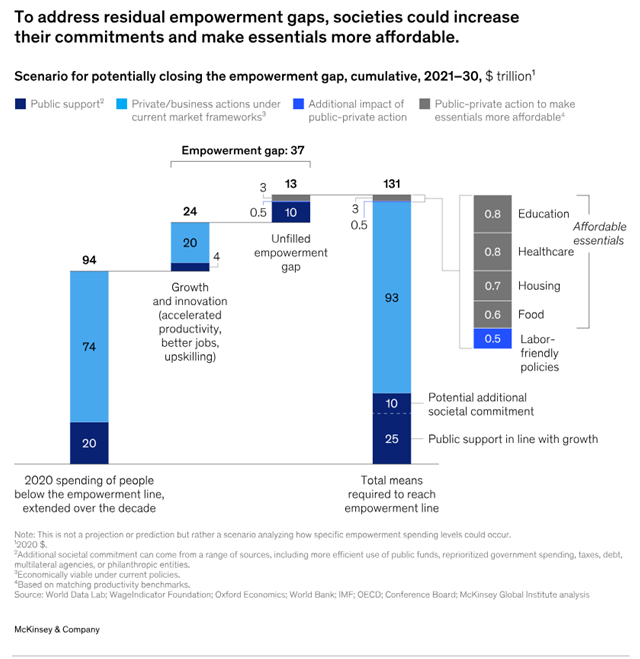Andrew Percy
8 September 2023
Can economic growth address both poverty and climate change? Andrew Percy discusses McKinsey’s latest report.
Sometimes a simple turn of phrase with a little alliteration brings a fresh new perspective to light. The idea that governments should set their sights on “higher empowerment” is a welcome development, and not one that I expected to hear from a global consulting firm more commonly associated with hard-nosed economics and geopolitical power analysis.
McKinsey Global, a consulting firm to many governments, has written a report called “From poverty to empowerment” that makes the case for a global effort to increase the empowerment of ordinary people everywhere.
What is really revealing is that even the most classical analysis of our challenges cannot close the “gap” with the standard mantras of economic growth, innovation, and technology. McKinsey, as one would expect, believes that economic growth should be the major driving force in the future and is clearly unaware that we live on a finite planet. But even with that framework they do not believe that economic growth alone will deliver a sustainable future.
They identify an “empowerment gap” which is preventing countries from reaching their true potential. The gap is expressed in the millions of people who live in conditions that prevent them being able to make their full contribution. 15 million people in the UK.
Closing that “gap” will require the reliable provision of “affordable essentials”, the report says. Their list of essentials lines up with the IGP’s Universal Basic Services: shelter, education, care and food. (They are missing transport and information services, but that’s why we do the work we do at the Institute for Global Prosperity to expand classical mindsets.)

Public action to ensure access to those essential services would contribute the equivalent to $3 trillion to closing the “empowerment gap” according to their report.
At the IGP we take a seriously different view on empowerment and prosperity to McKinsey. The problem is not usefully framed as spending power and the solutions to our problems are not going to come from never ending economic growth in a finite biosphere. But what is interesting is to see institutions grounded in the old ways of thinking acknowledge that there’s a missing piece in their puzzle. They can’t close all the gaps with just more and more economic activity. The gap they see cannot be closed economically. Social, public, collective action is needed.
Making the essentials of life accessible and affordable is going to be vital in our future and something we agree with McKinsey. One result of a Universal Basic Services approach will be increased productivity. But the really important result will be higher empowerment.
In a time of great challenges we will need great contributions from everyone. Higher and wider empowerment is the path to prosperity and we welcome McKinsey’s and everyone else’s shift to the global introduction of Universal Basic Services.
For more information about our Universal Basic Services work read:
Imagining a welfare state that supports secure livelihoods Towards prosperity:
Reinvigorating local economies through Universal Basic Services Universal Basic Prosperity
Andrew Percy is Director of the Social Prosperity Network at the Institute for Global Prosperity
Fatemeh Sadeghi
30 May 2024 Feminists in the Global South have stepped out of the conventional territories of ‘women’s matters’ into more fund...